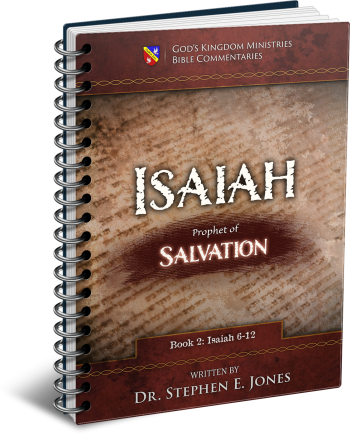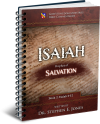Latest Posts
View the latest posts in an easy-to-read list format, with filtering options.

Isaiah is the prophet of Salvation. He is also known as the truly "Universalist" prophet, by which is meant that He makes it clear that salvation is extended equally to all nations and not just to Israel. He lived to see the fall of Israel and the deportation of the Israelites to Assyria, and he prophesied of their "return" to God (through repentance). He is truly a "major prophet" whose prophecies greatly influenced the Apostle Paul in the New Testament.
Category - Bible Commentaries

Christ lived among us on earth in His first appearance, but He did not marry the Bride at that time. The main principle behind marriage is to bring two into unity and agreement. At the time of Christ’s first coming, there was much disagreement. Even Christ’s disciples were still in the process of learning to be in agreement with Him.
Though destined for marriage, the Bride still needed to prepare herself for marriage (Rev. 19:7). In fact, not all individual members of the corporate bride had even been born yet. A great company was yet to be born and, as individuals, they too had to learn obedience while growing to the place of agreement. It took time for them as individuals and as a body to attain spiritual maturity.
Meanwhile, in Isaiah’s time, the prophecy given to Ahaz was fulfilled as a type and shadow of something greater yet to come. The virgin or young woman (almah) at that time was Hephzibah, who was destined to become the wife of Hezekiah, the son of Ahaz.
We do not know when she married Hezekiah, nor do we know how long they were married before she brought forth her son, Manasseh. But we do know that Manasseh was born three years after the Assyrian siege of Jerusalem. This was three years into the 15-year extension of life that Hezekiah received at the word of Isaiah (2 Kings 20:6). Manasseh was 12 when his father died (2 Kings 21:1).
Isaiah 7:15, 16 tells us that when Manasseh was still young, both Israel and Syria were to be conquered by Assyria.
15 He will eat curds and honey at the time he knows enough to refuse evil and choose good. 16 For before the boy will know enough to refuse evil and choose good, the land whose two kings you dread will be forsaken.
The Assyrians conquered Syria first, because King Ahaz had appealed to them for help. 2 Kings 16:8, 9 says,
8 Ahaz took the silver and gold that was found in the house of the Lord and in the treasuries of the king’s house and sent a present to the king of Assyria. 9 So the king of Assyria listened to him; and the king of Assyria went up against Damascus and captured it and carried the people of it away into exile to Kir, and put Rezin to death.
Historians give different dates for the conquest of Damascus and the deportation of the Syrians. However, we know that it occurred during the time of Ahaz. Years later, in the fourth year of Hezekiah (2 Kings 18:9), the Assyrians laid siege to Samaria in 723 B.C. and conquered the city in 721 B.C. at the end of Hezekiah’s sixth year (2 Kings 18:10).
Hence, Damascus and Samaria were conquered many years apart. Isaiah had prophesied to Ahaz that “the land whose two kings you dread will be forsaken.” This was a reference to Israel and Syria, but it did not happen all at once.
Neither did it occur while Manasseh was a child, for he was not yet born.
Samaria fell in 721 B.C. during Hezekiah’s sixth year. Eight years later, in the time of Sennacherib, king of Assyria, the Assyrian army ravaged the land of Judah, taking 200,150 people captive, according to the Assyrian records. The Prism of Sennacherib tells us,
“As for the king of Judah, Hezekiah, who had not submitted to my authority, I besieged and captured forty-six of his fortified cities, along with many smaller towns, taken in battle with my battering rams. ... I took as plunder 200,150 people, both small and great, male and female, along with a great number of animals including horses, mules, donkeys, camels, oxen, and sheep. As for Hezekiah, I shut him up like a caged bird in his royal city of Jerusalem. I then constructed a series of fortresses around him, and I did not allow anyone to come out of the city gates. His towns which I captured I gave to the kings of Ashod, Ekron, and Gaza.”
Sennacherib leaves out the fact that his army was destroyed when it attempted to conquer the city of Jerusalem (2 Kings 35-37). Nonetheless, we see that 46 “fortified cities” and “many smaller towns” were captured, and the survivors were deported to Assyria to join their brethren of the House of Israel in exile.
Only Jerusalem itself was spared.
As for the timing of the Assyrian invasion, 2 Kings 18:13 tells us,
20 Now in the fourteenth year of King Hezekiah, Sennacherib king of Assyria came up against all the fortified cities of Judah and seized them.
If 721 B.C. was the sixth year of Hezekiah, then this invasion occurred eight years later in 713 B.C. It did not take long for Assyria to conquer the land of Judah and deport the people of Judah. But when they surrounded Jerusalem, Hezekiah appealed to God through Isaiah (2 Kings 19:2, 3, 4, asking the prophet to “offer a prayer for the remnant that is left.”
Isaiah then prayed for “the remnant” and received the word from God that the Assyrian army would be prevented from even starting a siege (2 Kings 19:32). The sign given to seal God’s promise is given in 2 Kings 19:29-31,
29 Then this shall be the sign for you; you will eat this year what grows of itself, in the second year what springs from the same, and in the third year sow, reap, plant vineyards, and eat their fruit. 30 The surviving remnant of the house of Judah will again take root downward and bear fruit upward. 31 for out of Jerusalem will go forth a remnant, and out of Mount Zion survivors. The zeal of the Lord will perform this.
This was a Jubilee sign, where men were not to sow crops during the seventh Sabbath year, nor in the following Year of Jubilee, but in the third year they were allowed to “sow, reap, plant vineyards, and eat their fruit.” The actual terminology comes from Lev. 25:5 and 12.
The prophecy was obviously given “this year,” that is, the first of three consecutive years. These years, then, were from 713-711 B.C., the 14th, 15th, and 16th years of Hezekiah’s reign.
The king had no children at the time, no heirs to the throne, no one to carry on the lineage to the Messiah. Hence, he faced the same problem that his father, Ahaz, had faced when Israel and Syria had threatened to kill him and give the throne to Rezin, king of Syria. But whereas Ahaz had appealed to Assyria, Hezekiah appealed to God.
Manasseh was born in his father’s 17th or 18th year as the King of Judah. Manasseh was born in 710 B.C. Twelve more years passed before Hezekiah died and Manasseh took the throne at the age of 12. His reign began in 698 B.C.
But what about Isaiah’s prophecy in Isaiah 7:15 and 16? How and when was it fulfilled? The prophecy speaks of the boy’s childhood and how Syria and Israel will be forsaken before the child had reached the age of accountability.
Samaria was conquered in 721 B.C. Assyria invaded Judah in 713 B.C. Scripture shows us that Manasseh was born three years after the failed attempt to conquer Jerusalem. Judah had been desolated in that year, leaving just Jerusalem and whoever had been able to flee to the city as refugees during the siege. Most of the people of Judah had been killed or deported by the Assyrians. The nation of Judah had been brought down to a mere “remnant.”
This was the context in which Manasseh was born. He was “the surviving remnant of the House of Judah” (2 Kings 19:30) whose roots were to again be planted in the Year of Jubilee. Isaiah 7:15, 16, then, is proven by actual history to refer to the time of the Assyrian invasion of Judah, rather than to their earlier invasion of Israel.
Yet as usual, Isaiah’s prophecy referred to both invasions without clearly distinguishing between them.
We read in Isaiah 7:15, 16,
15 He will eat curds and honey at the time he knows enough to refuse evil and choose good.
When the land was desolated, crops and vineyards were either burned or confiscated. The normal diet in such times was from flocks and herds, which fed on pasturage. Hence, the diet of such difficult times was “curds and honey.”
16 For before the boy will know enough to refuse evil and choose good, the land whose two kings you dread will be forsaken.
In other words, by the time the boy has learned the meaning of “No! No!,” both Syria and Israel “will be forsaken,” (i.e., exiled).
Well, the first deportation of Samaria actually occurred before Manasseh was even born. But there may have been a later deportation when Manasseh was a child, as well as 65 years later in the time of Assurbanipal.
In the above prophecy to King Ahaz, Isaiah said nothing about an Assyrian invasion of Judah. However, much of his prophecy was fulfilled in such a time, for that was the setting for the birth and childhood of Manasseh, “the boy” in question.